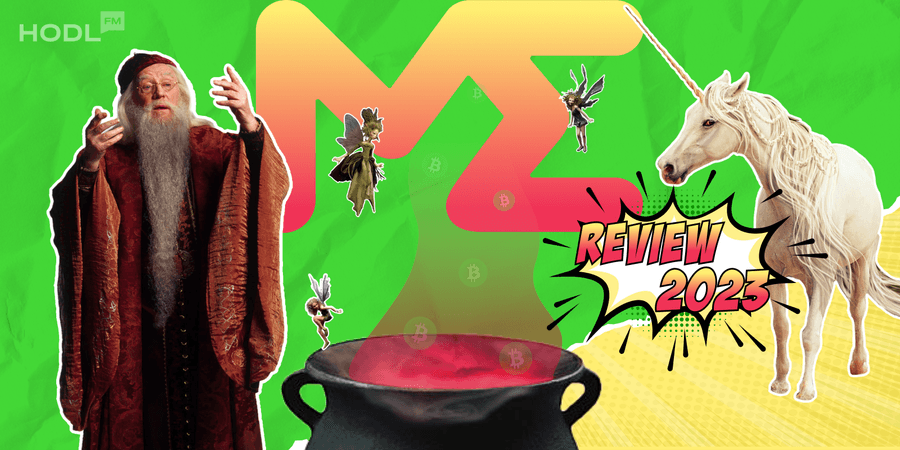Crypto is never dull. This week, companies are buying big, regulators are cracking down, and hackers are making headlines, here’s what’s happening.
Regardless, week's biggest winners and laggards show how volatile crypto can remain.
Top gainers and losers

- Zcash (ZEC) - Gained significant 55.17% this week up to a total price of $226.10
- Bittensor (TAO) - 19.63% rise and total price of $386,97 this week
- Starknet (STRK) - Catching up with 19.60% and price of $0.175

- MYX Finance (MYX) - this week lost the most 41.81% to a total price of $5.05
- DoubleZero (ZZ) - 36.10% drop for the past days and finish price of $0.334
- Pump.fun (PUMP) - closing this week trio with 22.99% loss and price of $0.005483
Bit Digital expansion
Bit Digital has deepened its bet on Ethereum, purchasing 31,057 ETH worth about $140 million, and pushing its total holdings above 150,000 ETH.
Crypto firm is now publicly listed among the largest corporate Ethereum treasuries worldwide, ranking sixth according to data from StrategicETHReserve.xyz.
Bit Digital’s CEO, Sam Tabar, said the transaction reflects the firm’s conviction in Ethereum’s long-term role within digital finance.
“This purchase demonstrates our commitment to building shareholder value by financing ETH accumulation on terms that are accretive to NAV per share,” Tabar said in the company’s announcement. “We view ETH as foundational to digital financial infrastructure and believe current levels provide a compelling long-term entry point.”
The convertible notes were priced at $4.16 per share, roughly 8.2% above Bit Digital’s mark-to-market net asset value at the time of issuance.
With its latest acquisition, Bit Digital now holds approximately 150,244 ETH, trailing only behind PulseChain Sac (160,900 ETH), the Ethereum Foundation (222,720 ETH), The Ether Machine (496,710 ETH), SharpLink Gaming (838,730 ETH), and Bitmine Immersion Technologies (2.83 million ETH).
As of late September, Bit Digital reported an estimated mNAV of $3.84 per share, supported by $512.7 million in Ethereum and $723.1 million in holdings of its majority-owned subsidiary, WhiteFiber Inc.
Tabar added that the company intends to expand its Ethereum position “in a cost-effective manner” while prioritizing long-term net asset value growth for shareholders.
Discord users may be exposed
Discord is facing an extortion attempt following a breach that reportedly exposed over 2.1 million users’ age-verification photos, including government-issued IDs.
The incident originated from a compromise of Discord’s Zendesk support system, which handles user inquiries and appeals. In a post on X, VX-Underground claimed the database contained 2,185,151 images, including pictures of passports and driver’s licenses uploaded by users seeking to confirm their age.
“Discord users’ driver’s license and/or passport might be leaked,” the group wrote.
Discord acknowledged the breach last week, stating that an unauthorized party gained access to its Zendesk instance on September 20. The company said the exposure was limited and involved “a small number of ID images” submitted by users who appealed age verification rulings.
“These were government-ID images (e.g., driver’s license, passport) from users who had appealed an age determination,” Discord said in a statement, promising to notify affected users by email.
Such distinction has raised new questions about the platform’s data-handling practices and its ability to separate temporary verification data from longer-term support archives.
“This kind of incident demonstrates the core problem with document-based verification systems,” said several security researchers commenting on the case.
Some blockchain and cryptography projects are developing privacy-preserving alternatives to document uploads. In August, the proof-of-stake network Concordium launched a mobile app allowing users to verify their age without revealing their identity, using zero-knowledge proofs (ZK-proofs), a cryptographic method that confirms facts without disclosing the underlying data.
Outside of crypto, in April, Google Wallet integrated similar ZK-proof technology to allow users to verify their age for restricted purchases and services, without transmitting ID photos to a central database.
FIFA’s blockchain goals
Switzerland’s gambling watchdog is reviewing whether FIFA’s new blockchain-based “Right-to-Buy” collectibles comply with national gambling laws.
FIFA’s experiment with blockchain ticketing is facing early scrutiny from Swiss authorities. The Swiss gambling regulator, Gespa, has launched a preliminary investigation into the governing body’s “Right-to-Buy” (RTB) collectibles, digital tokens that grant holders the option to purchase tickets for the upcoming 2026 FIFA World Cup in North America.
The FIFA Collect platform, developed in partnership with Modex Technologies, allows fans to buy RTB collectibles, which can then be redeemed for the right to purchase World Cup tickets. These collectibles are sold directly by FIFA and can also be traded on a secondary marketplace.
Antonio Lorenzon, Chief Marketing Officer at Modex, during the RTB launch in late September, said:
“Our mission is to bring fans closer to the game they love,” “By introducing Right-to-Buy on FIFA Collect, we are offering supporters a new and more direct way to be part of FIFA World Cup 26, turning digital collectibles into real-world opportunities.”
Holding the collectible guarantees fans access to a priority purchase window, allowing them to skip the general queue once ticket sales open. However, owning the collectible does not include the ticket itself, holders must still pay separately for their match tickets.
The FIFA Collect platform originally launched in 2022 on the Algorand blockchain, but earlier this year, FIFA announced its migration to its own Avalanche-based layer-1 network. The organization said, aims to provide “more immersive fan experiences” and enhanced digital engagement opportunities.
Official ticket sales for the 2026 tournament are being rolled out in phases. The Visa Early Presale began in mid-September, with additional sales rounds planned through the end of the tournament. A special allocation of tickets has reportedly been reserved for FIFA Collect users.
Dubai approach
Dubai’s Virtual Assets Regulatory Authority (VARA) has fined 19 companies for running unlicensed crypto businesses and violating marketing rules, imposing penalties of up to $163,000.
The regulator issued both financial penalties and cease-and-desist orders, part of what it described as an ongoing push to protect investors and reinforce Dubai’s reputation as a safe, well-regulated crypto hub.
“Enforcement is a critical component of maintaining trust and stability in Dubai’s virtual asset ecosystem,” VARA’s Enforcement Division said in a statement.
The penalized entities were found to be offering crypto-related services without approval or violating marketing disclosure rules, which were tightened in 2024 to require clear disclaimers and prior authorization before promoting crypto products to Dubai residents. At the time, VARA CEO Matthew White emphasized that the new rules compel virtual asset service providers (VASPs) to “deliver their services responsibly” and foster “transparency and trust in the market.”
All firms involved in the latest action were ordered to immediately halt operations and promotional activities, with fines ranging from 100,000 to 600,000 dirhams ($27,000–$163,000), depending on the nature and scope of each violation.
This isn’t the first time VARA has acted against unlicensed operators. In October 2024, the regulator fined seven crypto entities between $13,600 and $27,200 for similar breaches.
Nicholas McNicholas, VARA’s head of enforcement, said the authority considers several factors when determining penalties, including the seriousness and market impact of violations, as well as the degree of consumer exposure in Dubai.
“For marketing fines, VARA reviews the scope of targeting, the nature of the advertisements, and any indications that a firm was misrepresenting its licensing status,” McNicholas said.
According to VARA’s website, 38 entities have been sanctioned to date, 31 of them in 2025 alone, though the regulator did not specify which companies were included in the most recent enforcement round. Each sanctioned entity, McNicholas added, had the opportunity to appeal before publication of the penalties.
While the United Arab Emirates is widely viewed as a crypto-friendly environment, VARA’s latest actions show its focus on regulated innovation.
The authority said its licensing system is designed to “balance innovation with robust safeguards for all stakeholders,” ensuring the emirate’s reputation remains intact as it attracts global crypto firms.

Disclaimer: All materials on this site are for informational purposes only. None of the material should be interpreted as investment advice. Please note that despite the nature of much of the material created and hosted on this website, HODL FM is not a financial reference resource and the opinions of authors and other contributors are their own and should not be taken as financial advice. If you require advice of this sort, HODL FM strongly recommends contacting a qualified industry professional.




